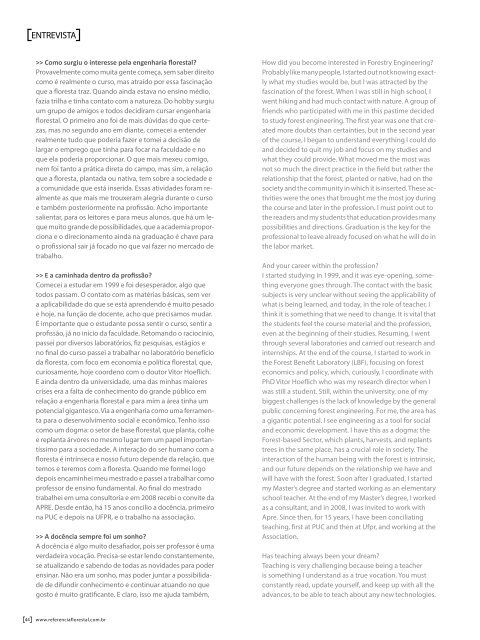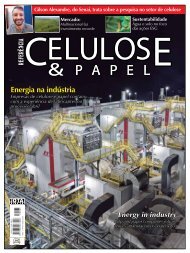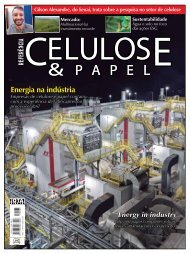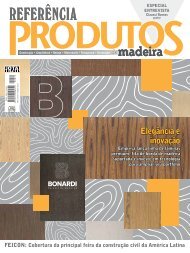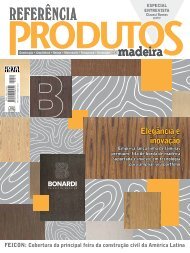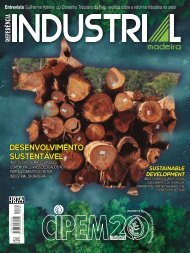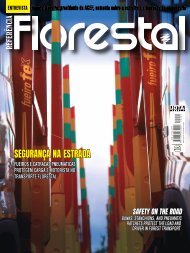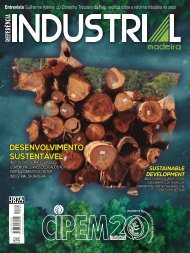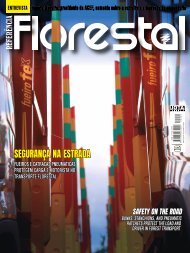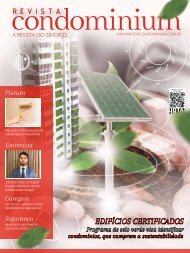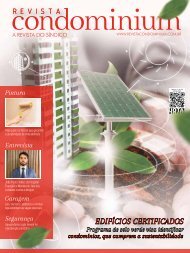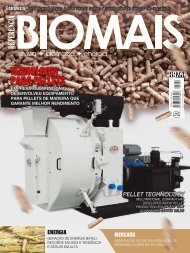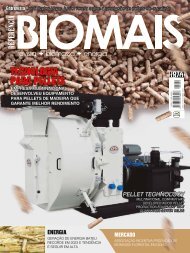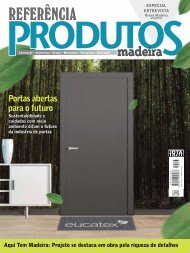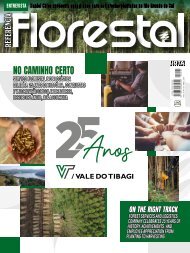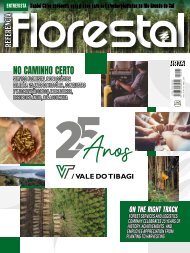Florestal_255 - Opps
Create successful ePaper yourself
Turn your PDF publications into a flip-book with our unique Google optimized e-Paper software.
ENTREVISTA<br />
>> Como surgiu o interesse pela engenharia florestal?<br />
Provavelmente como muita gente começa, sem saber direito<br />
como é realmente o curso, mas atraído por essa fascinação<br />
que a floresta traz. Quando ainda estava no ensino médio,<br />
fazia trilha e tinha contato com a natureza. Do hobby surgiu<br />
um grupo de amigos e todos decidiram cursar engenharia<br />
florestal. O primeiro ano foi de mais dúvidas do que certezas,<br />
mas no segundo ano em diante, comecei a entender<br />
realmente tudo que poderia fazer e tomei a decisão de<br />
largar o emprego que tinha para focar na faculdade e no<br />
que ela poderia proporcionar. O que mais mexeu comigo,<br />
nem foi tanto a prática direta do campo, mas sim, a relação<br />
que a floresta, plantada ou nativa, tem sobre a sociedade e<br />
a comunidade que está inserida. Essas atividades foram realmente<br />
as que mais me trouxeram alegria durante o curso<br />
e também posteriormente na profissão. Acho importante<br />
salientar, para os leitores e para meus alunos, que há um leque<br />
muito grande de possibilidades, que a academia proporciona<br />
e o direcionamento ainda na graduação é chave para<br />
o profissional sair já focado no que vai fazer no mercado de<br />
trabalho.<br />
>> E a caminhada dentro da profissão?<br />
Comecei a estudar em 1999 e foi desesperador, algo que<br />
todos passam. O contato com as matérias básicas, sem ver<br />
a aplicabilidade do que se está aprendendo é muito pesado<br />
e hoje, na função de docente, acho que precisamos mudar.<br />
É importante que o estudante possa sentir o curso, sentir a<br />
profissão, já no início da faculdade. Retomando o raciocínio,<br />
passei por diversos laboratórios, fiz pesquisas, estágios e<br />
no final do curso passei a trabalhar no laboratório benefício<br />
da floresta, com foco em economia e política florestal, que,<br />
curiosamente, hoje coordeno com o doutor Vitor Hoeflich.<br />
E ainda dentro da universidade, uma das minhas maiores<br />
crises era a falta de conhecimento do grande público em<br />
relação a engenharia florestal e para mim a área tinha um<br />
potencial gigantesco. Via a engenharia como uma ferramenta<br />
para o desenvolvimento social e econômico. Tenho isso<br />
como um dogma: o setor de base florestal, que planta, colhe<br />
e replanta árvores no mesmo lugar tem um papel importantíssimo<br />
para a sociedade. A interação do ser humano com a<br />
floresta é intrínseca e nosso futuro depende da relação, que<br />
temos e teremos com a floresta. Quando me formei logo<br />
depois encaminhei meu mestrado e passei a trabalhar como<br />
professor de ensino fundamental. Ao final do mestrado<br />
trabalhei em uma consultoria e em 2008 recebi o convite da<br />
APRE. Desde então, há 15 anos concilio a docência, primeiro<br />
na PUC e depois na UFPR, e o trabalho na associação.<br />
>> A docência sempre foi um sonho?<br />
A docência é algo muito desafiador, pois ser professor é uma<br />
verdadeira vocação. Precisa-se estar lendo constantemente,<br />
se atualizando e sabendo de todas as novidades para poder<br />
ensinar. Não era um sonho, mas poder juntar a possibilidade<br />
de difundir conhecimento e continuar atuando no que<br />
gosto é muito gratificante. E claro, isso me ajuda também,<br />
How did you become interested in Forestry Engineering?<br />
Probably like many people, I started out not knowing exactly<br />
what my studies would be, but I was attracted by the<br />
fascination of the forest. When I was still in high school, I<br />
went hiking and had much contact with nature. A group of<br />
friends who participated with me in this pastime decided<br />
to study forest engineering. The first year was one that created<br />
more doubts than certainties, but in the second year<br />
of the course, I began to understand everything I could do<br />
and decided to quit my job and focus on my studies and<br />
what they could provide. What moved me the most was<br />
not so much the direct practice in the field but rather the<br />
relationship that the forest, planted or native, had on the<br />
society and the community in which it is inserted. These activities<br />
were the ones that brought me the most joy during<br />
the course and later in the profession. I must point out to<br />
the readers and my students that education provides many<br />
possibilities and directions. Graduation is the key for the<br />
professional to leave already focused on what he will do in<br />
the labor market.<br />
And your career within the profession?<br />
I started studying in 1999, and it was eye-opening, something<br />
everyone goes through. The contact with the basic<br />
subjects is very unclear without seeing the applicability of<br />
what is being learned, and today, in the role of teacher, I<br />
think it is something that we need to change. It is vital that<br />
the students feel the course material and the profession,<br />
even at the beginning of their studies. Resuming, I went<br />
through several laboratories and carried out research and<br />
internships. At the end of the course, I started to work in<br />
the Forest Benefit Laboratory (LBF), focusing on forest<br />
economics and policy, which, curiously, I coordinate with<br />
PhD Vitor Hoeflich who was my research director when I<br />
was still a student. Still, within the university, one of my<br />
biggest challenges is the lack of knowledge by the general<br />
public concerning forest engineering. For me, the area has<br />
a gigantic potential. I see engineering as a tool for social<br />
and economic development. I have this as a dogma: the<br />
Forest-based Sector, which plants, harvests, and replants<br />
trees in the same place, has a crucial role in society. The<br />
interaction of the human being with the forest is intrinsic,<br />
and our future depends on the relationship we have and<br />
will have with the forest. Soon after I graduated, I started<br />
my Master’s degree and started working as an elementary<br />
school teacher. At the end of my Master’s degree, I worked<br />
as a consultant, and in 2008, I was invited to work with<br />
Apre. Since then, for 15 years, I have been conciliating<br />
teaching, first at PUC and then at Ufpr, and working at the<br />
Association.<br />
Has teaching always been your dream?<br />
Teaching is very challenging because being a teacher<br />
is something I understand as a true vocation. You must<br />
constantly read, update yourself, and keep up with all the<br />
advances, to be able to teach about any new technologies.<br />
44 www.referenciaflorestal.com.br


